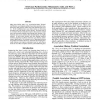Free Online Productivity Tools
i2Speak
i2Symbol
i2OCR
iTex2Img
iWeb2Print
iWeb2Shot
i2Type
iPdf2Split
iPdf2Merge
i2Bopomofo
i2Arabic
i2Style
i2Image
i2PDF
iLatex2Rtf
Sci2ools
111
click to vote
KDD
1998
ACM
1998
ACM
Memory Placement Techniques for Parallel Association Mining
Many data mining tasks (e.g., Association Rules, Sequential Patterns) use complex pointer-based data structures (e.g., hash trees) that typically suffer from sub-optimal data locality. In the multiprocessor case shared access to these data structures may also result in false sharing. For these tasks it is commonly observed that the recursive data structure is built once and accessed multiple times during each iteration. Furthermore, the access patterns after the build phase are highly ordered. In such cases locality and false sharing sensitive memory placement of these structures can enhance performance significantly. We evaluate a set of placement policies for parallel association discovery, and show that simple placement schemes can improve execution time by more than a factor of two. More complex schemes yield additional gains.
Related Content
| Added | 06 Aug 2010 |
| Updated | 06 Aug 2010 |
| Type | Conference |
| Year | 1998 |
| Where | KDD |
| Authors | Srinivasan Parthasarathy, Mohammed Javeed Zaki, Wei Li |
Comments (0)

